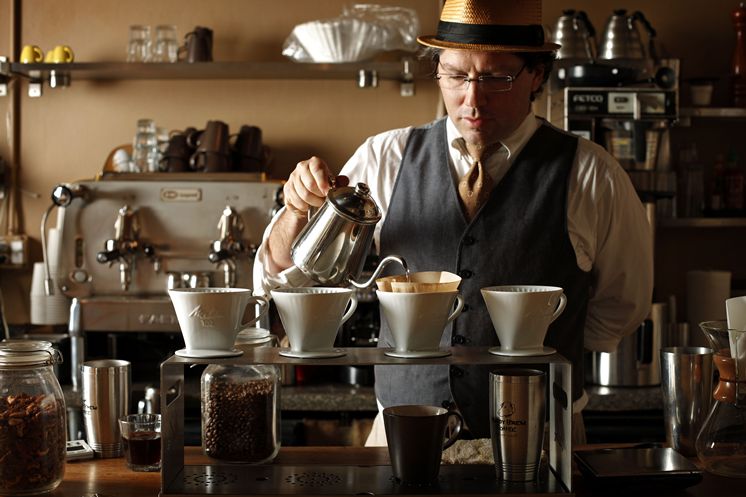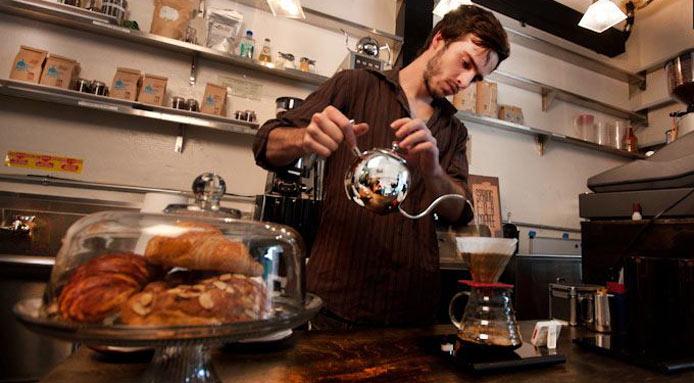
Five Buck Chuck or No Slip Chip: Which Type of Manager are You?
Without a doubt, the capital sin of small coffee retailers that keeps their businesses from healthy growth is an ongoing effort of trying to “buy their way to success.” This might sound good in theory and seem natural to many managers, but these individuals tend to cling to their hard earned dollar so tightly that they neglect the potential fat-walleted customer who would gladly become a loyal patron given the proper motivation. Having worked with many different managers, we have concluded there are two types of coffee shop managers personified by Five Buck Chuck and No Slip Chip.
Five Buck Chuck’s Management Style
Five Buck Chuck manages a small coffee shop in downtown Denver with only a few part time employees. Chuck runs his business with a mentality rooted in self-preservation. He has maintained a steady flow of customers for a couple years and he focuses on retaining the consistent patrons the shop has developed. Having overcome several roadblocks on his own, he considers himself self sufficient and will avoid enlisting other individuals’ and businesses’ help as much as possible. His goal is to survive by saving every cent he can; he seeks out products with the largest profit margin even if they are lower quality than comparable, more expensive alternatives. He will either drive himself or send an employee to a wholesale store multiple times a week in order purchase essential items. When he returns from work related outings, he finds certain cleaning and maintenance related chores left undone and stays at the cafe late to pick up the slack.
Chuck doesn’t sound too bad does he? He’s frugal and conservative which are both necessary traits in successful managers. The truth is his approach is preventing his business from expanding the way it is capable of. Each trip he or an employee makes to Costco or Restaurant Depot may save $50, but these managers are usually unaware of the more valuable resources that were neglected along the way. Hired help is the #1 complaint of small business owners, especially in the food service industry. Every time Chuck steps away from his cafe he leaves it under the supervision of employees who vary in loyalty and reliability. When he sends an employee to run errands, he assumes the liability, and has to pay for reimbursement of gas on top of the employee’s wage.
No Slip Chip’s Management Style
Now lets take a look at the way No Slip Chip runs his cafe. His coffee shop is not far from Chucks but has pleasant mix of faithful customers and new faces waiting in line. Through proper delegation and management of time and money, Steve is able to focus on forward thinking strategies that will push his coffee shop into the lime light. He understands that as manager, he is tasked with the growing momentum of the company he represents. He does what he can to free himself to engage in advertising and progressive marketing. Part of his success can be attributed to the research and development he allows his wholesale distributor to do for him. Most importantly, he minimizes the amount of time when his customers aren’t receiving his direct attention. He trusts his employees, but realizes that his presence among them ensures proper customer service and work ethic. Rather than being paralyzed by the fear of losing money, managers like Steve are shrewd entrepreneurs and are motivated by a desire for success. They actively sell their way to it.
We dislike Starbucks as much as the next coffee related business, but we can’t deny Howard Schultz’s unprecedented success in cafe promotion and management. Managers with the Schultzian spark, like Steve, are willing to spend money on services that will save them time running errands and researching new products. In Schultz’s own words, “you can’t build any kind of organization if you’re not going to surround yourself with people who have experience and skill base beyond your own.”
The truth is Chuck and Chip have different ideals. Chuck is concerned with costs whereas Chip cares about quality. The irony is that managers like Chip maximize operational efficiency despite their greater investment in external services. Chip never runs out of product and doesn’t have to make a last minute sprint to the store for bottle of hazelnut syrup.
If you find yourself managing in Chuck’s mentality, consider these next three tips friendly reminders of effective managerial strategy.
1) Put a value on your time (a specific dollar amount isn’t a bad idea).
2) Prioritize your responsibilities by delegating and outsourcing tasks that distract you from the work directly related to the growth of your cafe.
3) Spend time with vendors and marketing specialists developing strategies that will surprise regular customers while drawing new customers in.
If you want some other tips for effective coffee shop management, check out this article from Forbes magazine, written by a gentleman who has opened up over a dozen successful coffee shops. Encouraged by popular demand, our next post will talk about “the role of vendors in the life of a coffee shop.” We wish you the best in your managerial/ownership endeavors, and we leave you with the wise words of the author Paul Sweeney, “True success is overcoming the fear of being unsuccessful.”
[polldaddy poll=8114286]




